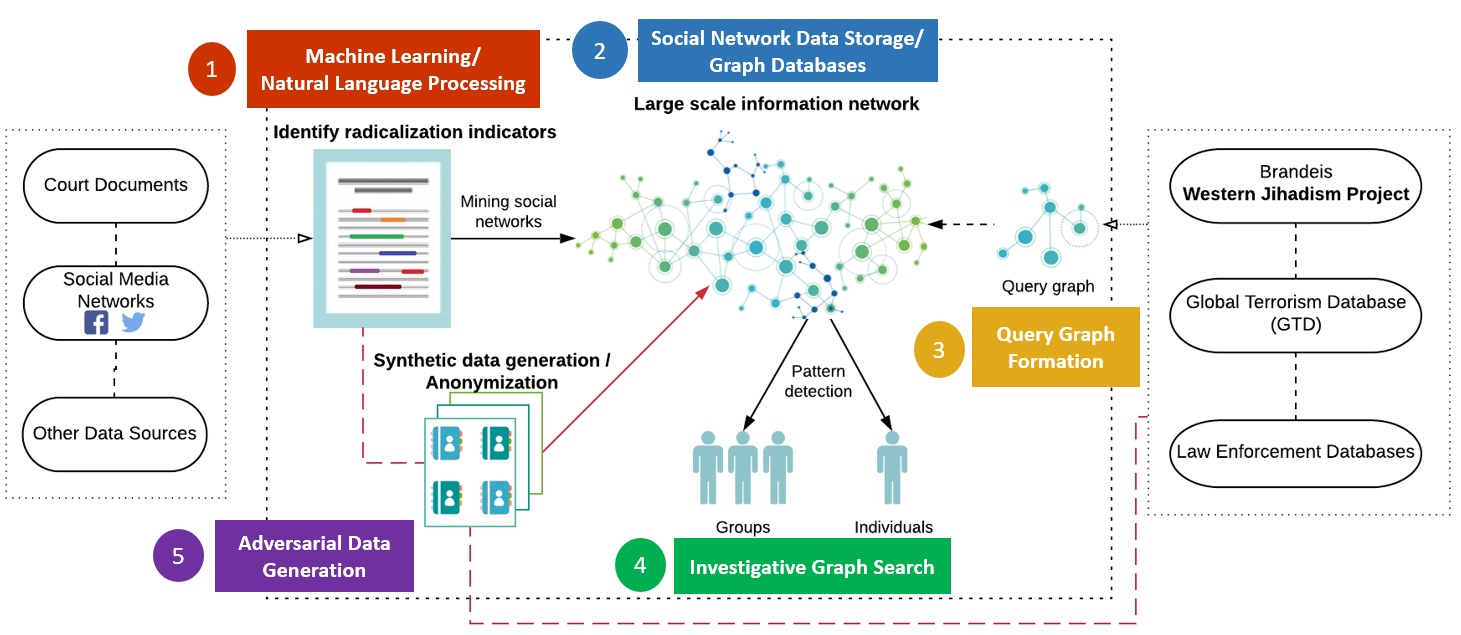Introduction

Identifying latent and emergent behavioral patterns of individuals and groups is vital in homeland security, behavioral health, cybersecurity, consumer analytics, and other behavioral pattern detection disciplines. This research focuses on domestic radicalization and proposes tools and techniques to detect suspicious homegrown violent extremists which will be beneficial to administrative bodies and law enforcement authorities. This is a collaborative research with
the Western Jihadism Project, Brandeis University, MA, USA. They have already studied forensic biographies and radicalization paths of American jihadists and we consume their data to implement and validate our proposed end-to-end investigative pattern detection framework. As interprets in the above, the high-level architecture diagram of the project, we mainly focus on;
We have integrated different NLP techniques (Named Entity Recognition (NER), Rule-based matching, Coreference resolution, Multi-label text classification) using cutting edge NLP libraries like Spacy, BERT and able to automate the radicalization indicators extraction for a prominent level. We propose diverse investigative graph searches while leveraging different data storage mechanisms for social networks. Since only limited actual data is available, we are looking for approaches to generate profiles while preserving real features of the dataset. Currently, we work on improving the scalability of our tools and techniques by manipulating larger datasets to adhere with real-world scenarios.
This work was supported by the U.S. Department of Justice, Office of Justice Programs/National Institute of Justice under Award #2017-ZA-CX-0002. Opinions or points of view expressed in this article are those of the authors and do not necessarily reflect the official position of policies of the U.S. Department of Justice.
Publications
- S. R. Muramudalige, B. W. K. Hung, A. P. Jayasumana, I. Ray, and J. Klausen, “Enhancing investigative pattern detection via inexact matching and graph databases,” Under Review.
- S. R. Muramudalige, A. P. Jayasumana, and H. Wang, “Adversarial Data Generation of Multi-category Marked Temporal Point Processes with Sparse, Incomplete, and Small Training Samples,” Submitted.
- H. Shirazi, S. R. Muramudalige, I. Ray, and A. P. Jayasumana, “Improved Phishing Detection Algorithms using Adversarial Autoencoder Synthesized Data,” in Proc. 2020 IEEE 45th Conference on Local Computer Networks (LCN), pp. 24-32, Sydney, NSW, Australia, 2020.
- B. W. K. Hung, S. Muramudalige, A. P. Jayasumana, J. Klausen, R. Libretti, E. Moloney and P. Renugopalakrishnan, “Recognizing Radicalization Indicators in Text Documents Using Human-in-the-Loop Information Extraction and Natural Language Processing Techniques,” in Proc. 2019 IEEE International Symposium on Technologies for Homeland Security (HST), Woburn, MA USA, Nov. 2019.
- B.W.K. Hung, A. P. Jayasumana and V. W. Bandara, “Finding Emergent Patterns of Behaviors in Dynamic Heterogeneous Social Networks,” IEEE Transactions on Computational Social Systems, vol. 6(5), pp. 59-75, Oct, 2019.
- S. R. Muramudalige, B.W. K. Hung, A.P. Jayasumana and I. Ray, “Investigative Graph Search using Graph Databases,” in Proc. 2019 First International Conference on Graph Computing (GC 2019), pp.60-67, Laguna Hills, CA, Sept. 2019.
- J. Klausen, R. Libretti, B.W.K. Hung and A. P. Jayasumana, “Radicalization Trajectories: An Evidence-Based Computational Approach to Dynamic Risk Assessment of ‘Homegrown’ Jihadists,” Studies in Conflict & Terrorism, Taylor & Francis, 2018. (doi : 10.1080/1057610X.2018.1492819)
- B. Hung, A. P. Jayasumana and V. W. Bandara, “INSiGHT: A System to Detect Violent Extremist Radicalization Trajectories in Dynamic Graphs,” Data and Knowledge Engineering, Vol, 118, Elsevier, Nov. 2018. (doi : 10.1016/j.datak.2018.09.003)
- B. Hung, A. P. Jayasumana and V. W. Bandara, “INSiGHT: A System for Detecting Radicalization Trajectories in Large Heterogeneous Graphs,” Proc. IEEE 2017 International Conference on Technologies for Homeland Security (HST2017),Waltham, MA, USA, April 2017. (doi: 10.1109/THS.2017.7943441)
- B. Hung, A. P. Jayasumana and V. W. Bandara, “Pattern Matching Trajectories for Investigative Graph Searches,” Proc. 3rd IEEE International Conference on Data Science and Advanced Analytics (DSAA 2016), Montreal, Canada, Oct. 2016. (doi: 10.1109/DSAA.2016.14)
- B. Hung, A. P. Jayasumana and V. W. Bandara, “Detecting Radicalization Trajectories Using Graph Pattern Matching Algorithms,” Proc. Doctoral Consortium of the IEEE International Conference on Intelligence and Security Informatics (ISI 2016), Tucson, AZ, Sept. 2016.(doi: 10.1109/ISI.2016.7745498)
- B. Hung and A. P. Jayasumana, “Investigative Simulation: Towards Utilizing Graph Pattern Matching for Investigative Search,” Proc. International Symposium on Foundations of Open Source Intelligence and Security Informatics (FOSINT-SI 2016), IEEE/ACM ASONAM 2016, San Francisco, CA, USA, August 2016.(doi: 10.1109/ASONAM.2016.7752333)

